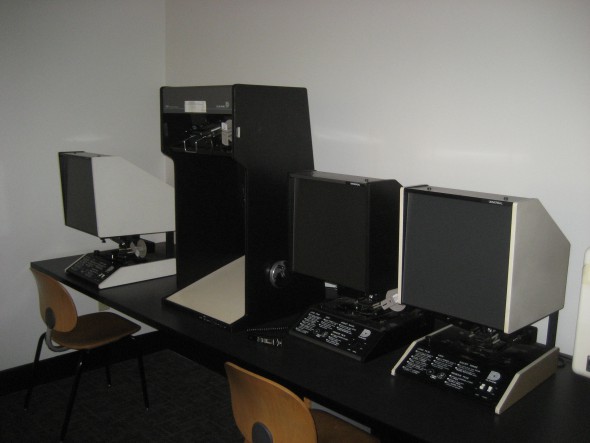Library Charged $1.5 Million for Journal Archive
Library turned down NewsBank offer; Journal Sentinel promises archive, but when?
Last Tuesday, when more than a century’s worth of historic on-line archives of The Milwaukee Journal and Milwaukee Sentinel abruptly disappeared from the internet, it came without warning to City Librarian Paula Kiely, she said in an interview in her office in the Central Library Monday. “I spent 60 per cent of my day today working on this,” Kiely said. Much of that was gathering files relating to the archives, and in communications with parties involved in the situation.
The library was originally a key player in the digitization of the newspaper archives. Kiely says she was approached by Journal Sentinel digital news editor Alan King in late 2008 to have the papers digitized by Google, and she offered to assist. She contacted Torilo Verme of Google who explained that the company would provide free access to the archives for the world. Revenues would come from advertisements, she was told, which would be split between Google and the original publishers of the work — not the library.
Google said the program “would be a great benefit to the community,” and that it had “no plans to sell it to a third party.” Intrigued, Kiely asked if her colleagues on the Urban Library Council, a national trade group had heard of the digitization. “Nobody had experienced it at that time. We were one of the first.” Kiely took the novel proposal to her board, which gave its approval.
“It seemed like a win-win situation at the time,” Kiely said Monday. “Now, not so much.”
Google would digitize microfilmed versions of the paper held by ProQuest, an Ann Arbor firm founded in 1938 as University Microfilms.
Library Owned 30 Per Cent of Issues Digitized
The work was soon underway when a catch developed — the ProQuest archives were incomplete. Milwaukee Journal images from 1910-1920 were unavailable, as were Milwaukee Sentinel images from 1837-1909. This amounted to about 30 per cent of the total. But Kiely and the library let Google digitize the films it owned from those years, and a new resource was made available to the public.
By 2011 Google had digitized nearly one million pages from 2,000 papers worldwide when it called off the project with little explanation. Some felt that the company was facing possible copyright issues, which it thought it had resolved by making scanned images — and not text — available. Google made this statement at the time, mentioning specifically a Milwaukee paper:
“As part of the Google News Archives digitization program we collaborated to make older newspapers accessible and searchable online. These have included publications like the London Advertiser in 1895, L’Ami du Lecteur at the turn of the century, and the Milwaukee Sentinel from 1910 to 1995.
“Users can continue to search digitized newspapers at http://news.google.com/archivesearch, but we don’t plan to introduce any further features or functionality to the Google News Archives and we are no longer accepting new microfilm or digital files for processing.”
However, the Milwaukee files remained accessible for searching until last week.
Was Approached in May
At the request of Gannett, the Journal Sentinel’s new owner, the newspaper asked Google to hand over the keys to the archives to NewsBank, and Google acquiesced.
Then, in spring, a salesperson from NewsBank came calling to Kiely, offering on May 3rd to sell the rights to the database to the library, this same database which had gotten 30 percent of its materials from the library. The offer would expire on May 30th.
“The price they were asking for the database was a surprise, so we chose not to act on it,” Kiely said.
For the Journal archives alone from 1841-1960, the company was asking for a $1.5 million payment! — with an additional one per cent assessment for the next three years. “We would own the database,” Kiely said.
Kiely says she contacted Journal Sentinel executives who were not aware of the sums asked by NewsBank; nor, she said, were they aware that 30 per cent of the archive was based on library-owned documents.
And, here the matter stands, unresolved, with many questions raised, and a huge loss to the community of a valuable resource. The Milwaukee Sentinel is the only paper of the two to have been indexed by the library. It has a card catalog that covers the paper from 1837-1890 — hardly a search tool of much use, but the only one left.
Kiely says she spoke to Sherman Williams of the Journal Sentinel who told her that the entire archive would soon be available.
I wrote to Journal Sentinel president Chris Stegman, who spoke of a “solution” to the paper’s self-inflicted problem. He responded:
“Our archives should be available again soon — as we switch over to our new parent company’s systems we are also switching our archiving system from Google to NewsBank. There is a delay in the process but we hope to have them available again shortly. I apologize for the inconvenience and hope our solution is up and running soon.”
But it would appear some kind of negotiation is going on between NewsBank and the Journal Sentinel. Kiely, who spoke to NewsBank Monday, says a representative told her they would “bring up the database as soon as they have an agreement.”
Journal Sentinel Not First NewsBank Hostage
Although the Milwaukee papers were among the first to be digitized, they were not the first to be held hostage by NewsBank, which charged other public libraries the following prices, according to Kiely.
- The Seattle Public library paid $400,000 for the digital rights to the Seattle Times
- The East Baton Rouge Public Library paid $800,000 for the rights to the Baton Rouge Advocate
- The Sacramento Public Library will pay $1.2 million over 5 years for the Sacramento Bee records.
Journal Sentinel Archive Stories
- Journal Sentinel Archive Disappears – Michail Takach
- Library Charged $1.5 Million for Journal Archive – Michael Horne
If you think stories like this are important, become a member of Urban Milwaukee and help support real, independent journalism. Plus you get some cool added benefits.
More about the Lost Journal Sentinel Archive
- Plenty of Horne: Journal and Sentinel Archives Threatened - Michael Horne - Feb 10th, 2020
- Back in the News: Journal Sentinel Archive Will Return? - Bruce Murphy - Sep 2nd, 2016
- Library Charged $1.5 Million for Journal Archive - Michael Horne - Aug 23rd, 2016
- Journal Sentinel Archive Disappears - Michail Takach - Aug 19th, 2016
Read more about Lost Journal Sentinel Archive here
Plenty of Horne
-
Milwaukee Modernism Gains National Awards
 Dec 15th, 2025 by Michael Horne
Dec 15th, 2025 by Michael Horne
-
New Rainbow Crosswalks Mark Milwaukee’s LGBTQ+ History
 Oct 8th, 2025 by Michael Horne
Oct 8th, 2025 by Michael Horne
-
Welcome Back, Tripoli Country Club!
 May 27th, 2025 by Michael Horne
May 27th, 2025 by Michael Horne
The Press
-
A New State “Progressive” Publication
 Jul 16th, 2019 by Bruce Murphy
Jul 16th, 2019 by Bruce Murphy
-
Journal Sentinel’s Post-Gannett Decline
 Nov 21st, 2017 by Bruce Murphy
Nov 21st, 2017 by Bruce Murphy
-
The Legacy of Eric Von
 Jun 23rd, 2017 by Amanda Maniscalco
Jun 23rd, 2017 by Amanda Maniscalco
























You get the impression that Newsbank, unsure of how it would make money on the open market, wants the public libraries — which are taxpayer supported — to provide the millions they want to operate.
I would have thought that the newspapers that old would have entered the public domain.
“Milwaukee Journal images from 1910-1920 were unavailable, as were Milwaukee Sentinel images from 1837-1909. ”
Someone explain to me how these are not in the public domain. Somebody. Anybody.
And what about a newspaper publisher’s statutory responsibility to provide and maintain access to a “newspaper of record” which I’m sure the Journal was.
Please keep digging into this for us. Thanks!
Why didn’t MPL obtain a written agreement with Google when they provided access to their records on such a large scale? Sounds like something a good attorney representing MPL should have been involved with.
This is a cautionary tale about digital media- you don’t know who will own the digital rights in the future, and the permanancy of your access, and at what price, is only as good as whatever agreement you have with the owner of the rights.
Correct that last sentence, the owner of the digital media.
To those wondering about why the newspaper isn’t in the “public domain”: This is not what is at issue. What is at issue is the platform that allows access to the documents. Even if the newspaper is in the “public domain,” this doesn’t mean you get access to somebody else’s transcriptions or photocopies. You can go out and make your own trascriptions and even reproduce things in the “public domain” but you don’t necessarily get access to somebody else’s reproductions. BTW: I’m not condoning the actions of Google or the tertiary party; I absolutely condemn them; I am only explaining how something in the “public domain” can also become something that can be used to turn a profit.
Combining what’s been written here with the agenda and minutes of the March 17, 2009 MPL Board meeting, apparently the Journal-Sentinel had copies of a master file owned by MPL. Ms. Kiely was under the impression that no “public library” had done anything like this before. Not true. The Google Books digitization project had been going since December of 2004 and the public libraries involved had posted online the agreements they made with Google (U. of Michigan’s is still online at <http://www.lib.umich.edu/files/services/mdp/um-google-cooperative-agreement.pdf). All the agreements included a provision that the contributing library would get a set of files consisting of the digitized images and the text file derived from optical character recognition. Why did Ms. Kiely not know about these agreements? Why did the Library's lawyer not think to get a copy from the University of Wisconsin, which also put its agreement online? If MPL had done its due diligence, the people of Milwaukee would still have images and (searchable) text files of 30% of the archive. And if J-S had been on the ball, perhaps we would have ALL of the archive that is out of copyright still available to all–and would not be faced with demands to repurchase what the taxpayers already purchased, bound, rebound, dusted, heated, cooled, retrieved, reshelved and generally lovingly cared for for over a century. What an opportunity caused by MPL's fecklessness.
The lead photo brings back memories. I came across this card catalog in the 1980s when I was doing some research. Later when I got heavily into genealogy I found out that I could just do a surname search and find a reference to a certain newspaper article. As you see in the photo the card catalog for the Sentinel was from 1837 to 1890. I think there was a similar set for the Milwaukee Journal from 1882 to 1890.
Frank Zeidler told me later that this card catalog was put together during the Depression. He named the person in charge but I long ago forgot. Frank remembered everything.
The Milwaukee Journal-Sentinel is still a going concern, so its archives are not in the public domain. This is true of all the big, old newspapers. Hence the NY Times and LA Times archives are definitely not free online, and libraries pay a lot of money to subscribe to the digitized microfilm.
NewsBank is merely trying to avoid what’s known in economics as the “free-rider” problem. The public library’s mistake was contributing material to the digitization project it didn’t have a legal right to reproduce. One has to go back to the 2001 New York Times vs. Jonathan Tasini case (https://en.wikipedia.org/wiki/New_York_Times_Co._v._Tasini) to understand why.
There is a great deal of effort and expense involved in developing, maintaining and sustaining a database of cultural heritage material. Milwaukee PL has no right to free access, and in fact should expect to pay to help sustain the collection.
If the economics of DRM, digitization and preservation is of interest, read anything you can find by Brian F. Lavoie of OCLC.
The card catalogue was a WPA project. It’s described in an article by Daniel Ring (p.33):
It shows the value of doing cultural heritage projects like this with public funding rather than leaving them to private for-profit companies like Google. If we care about them, we should be willing to fund them and the institutions that can make them freely available in perpetuity.
Yes, the WPA did many newspaper filming projects in the 1930s. They are a huge cultural asset, especially where the papers are now defunct. But that effort has no bearing on digital rights, if that was your point.
Vicky, I only meant it in the sense that a properly funded and organized public project would have had more interest in long-term access than Google did, and would have made securing the digital rights a higher priority in negotiations with the Sentinel. They would also have made a point of getting and preserving digital copies of the out-of-copyright portion of the digitized newspapers (up to the end of 1922), so that at least this public domain material could not be arbitrarily blocked from public access. Of course, they might not have been successful in negotiating the necessary deal with the Sentinel’s owners, but at least there would have been someone in the game fighting for the public good.
Milwaukee Journal is online back to 1921. 1921-1935 were added recently.
It’s accessible from a home computer with an MPL.org library card.
Follow the links: Research > All Library Databases > “America’s Obituaries and Death Notices”.
Suburban libraries may not provide that access 8-(
Otherwise use an MPL.org computer terminal or their WIFI for access.
It’ my personal experience in listening and talking to other patrons that MPL.org librarians (at the downtown library) generally will not tell a patron about this access.
Thanks for that, Gary Rebholz, this means there is room for hope. Unfortunately it doesn’t help me much right now as I need the April 1903 editions of the paper. And to the man who acknowledged Frank Zeidler in his post above, Ron F., I appreciated the tip of the cap to former Milwaukee mayor Zeidler. I met him during his waning years when I taught school in Milwaukee around 1995 and thoroughly enjoyed our conversation about the old Milwaukee Brewers of the American Association. And if you’re a baseball fan, please check out my blog at http://almanacpark.blogspot.com/
Due to corporate merging and the elites owning most of the world’s wealth the internet will be more and more unusable and unaffordable as the web goes to subscription model only.
When you only look at one site then it doesn’t seem to bad to pay 10 dollars a month to go to your favorite site but a lot of people who go beyond shop and chat may visit 10 pages a day and that is 10$ X 10 just to read something.
When Dad was looking more into why things are going to subscription only he got a payment noticed to read an article about payments! LOL. We both remember the days when the web was a more open frontier.
I feel we are really close to the movie Idiocracy except for the naked butts part though public art has a lot of those so no fear there! You can blame it on capitalism you can blame it on the left but the truth is public education has failed us and the rich are the ones thinking we are not worth their time AND most of us have an “F-off” attitude so nobody will want to look at us peons.
The US Government and big business didn’t really get into controlling the web until the Egypt Revolution and suddenly got very scared.
Before then it was mostly porn they were after and you could find funny stuff that was not naughty for free like instant happenings.